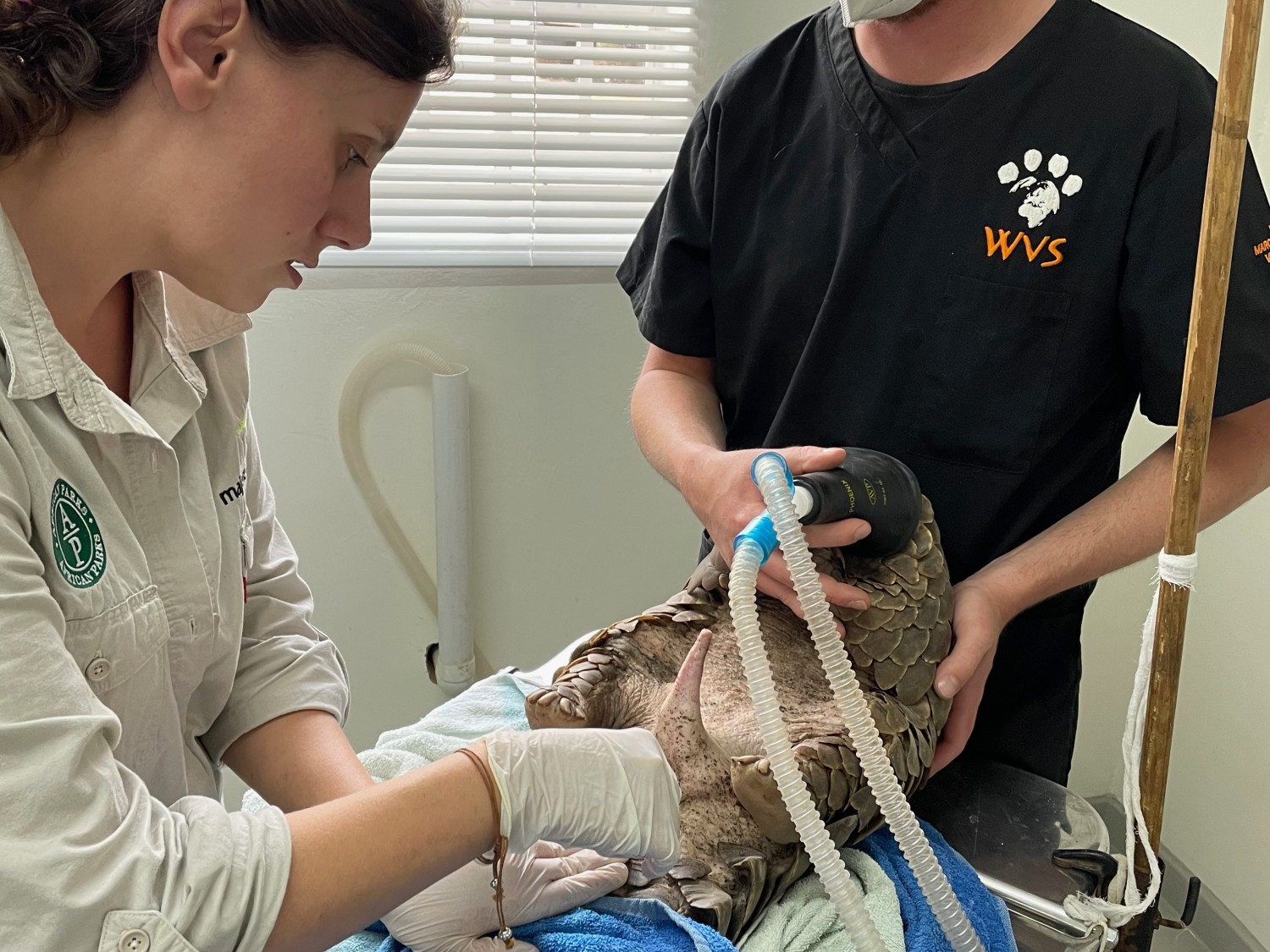Pangolins are the most trafficked animals on the planet. They are poached for their meat, scales, and organs, which are dried and ground up into powder, and mainly used in traditional Chinese medicine. With hundreds of thousands being taken from the wild every year across Africa and Asia, the health and safety of every single pangolin are crucial for the future of the species.

In Malawi, the Majete Wildlife Reserve is a safe haven for pangolins and other endangered wildlife. When a wild animal requires medical attention, the rangers call upon our vets. Our team is able to assist with everything from health checks to critical first aid, to help get these animals back to their rightful homes in the wild.

Pangolins, Alile, Thuma, Wamkulu, and Tamanda, were four of our patients.
Alile the Pangolin
The first pangolin, Alile, was found curled around an electric fence in the wildlife reserve. This is a big problem in all wildlife reserves, and one that rangers and vets are often helpless against. The electric shock can result in organ failure, making it impossible to treat. Sadly, like many animals before her, Alile succumbed to her injuries and passed away, after our nurse tried her best to save her.
In Majete, the park manager reacts to the reports of electrocuted pangolins along the fence line and has started the process of elevating the lowest wire high enough to keep the pangolins safe – but low enough to keep other animals inside the park. Not an easy task!
Thuma the Pangolin
The second pangolin, Thuma, only a youngster weighing 3.5kgs, was spotted a long way from home. She was found outside the wildlife reserve, wandering around a nearby village.

The determined little pangolin was healthy and very strong, but too young to be released. Instead, Thuma was taken to an experienced wildlife carer who will care for her until she is ready to be released.

Wamkulu the Pangolin
The third pangolin, Wamkulu, had experienced first-hand how cruel humans can be. He was a victim of the illegal wildlife trade, poached from the wild, and attempted to be sold for his meat and scales. Although, Wamkulu was one of the lucky ones. He was rescued and handed over by the courts, but not without escaping life-threatening injuries.

When our vets examined Wamkulu, a 12-kilogram male, they found wounds on his legs, which he had either sustained from being tied or from the snare that captured him. His paws were also soft, an indicator that he'd been in captivity for some time.

In cases such as this, the stress and suffering imposed on the animal are unimaginable, and as a result, many don't recover. Our team tried their best, administered intravenous fluids, antibiotics, and pain relief, cleaned the wounds on his legs, and walked with him in the park for many hours throughout the night, on the search for just the right ants to eat. They also consulted with other wildlife experts and specialists at the Tikky Haywood Foundation, Lilongwe Wildlife Trust, and Thuma Forest Reserve, but devastatingly, Wamkulu was too sick, and died after four days in care.
The post-mortem examination showed signs of pneumonia and severe gastric ulceration. Specialists explained that these are typical findings in poached pangolins.
Tamanda the Pangolin
Rangers from the Malawi Department of National Parks and Wildlife (DNPW) and African Parks had rescued Tamanda, a ground pangolin, from the cruel grips of poachers. She was still alive, but she was weak, dehydrated, and malnourished, with a head tilt, and often falling over to one side. The little pangolin needed immediate veterinary attention.
At the BSPCA clinic in Blantyre, our vets provided Tamanda with critical first aid.
Whilst she was under anesthesia, she received a full physical exam, intravenous fluids, as well as oral dextrose (to treat low blood sugar), vitamins, and minerals via a stomach tube. She also received medications to help prevent stress-induced pneumonia.
It worked. The pangolin recovered amazingly well and within a few days, she was ready to return home.
With such a high demand for pangolins in the illegal wildlife trade, it was important to release Tamanda in a protected area within her home territory, where it was both familiar and safe. The rangers found the perfect location. They opened the transport cage and watched her make a quick trip to a nearby watering hole, before zooming off into the thicket.
Help Save Pangolins
Together, we have the power to protect wildlife. By refusing to buy wildlife products, reporting wildlife crime, and supporting our efforts to treat animals rescued from the illegal wildlife trade, we can help keep animals like Alile, Thuma, Wamkulu, and Tamanda from harm's way.
Donate today, on World Pangolin Day, and help us save lives.
Related Content
Learn more about our efforts to conserve wildlife through expert vet care, from treating injured zebras in Malawi to caring for sick and orphaned elephants in Myanmar.